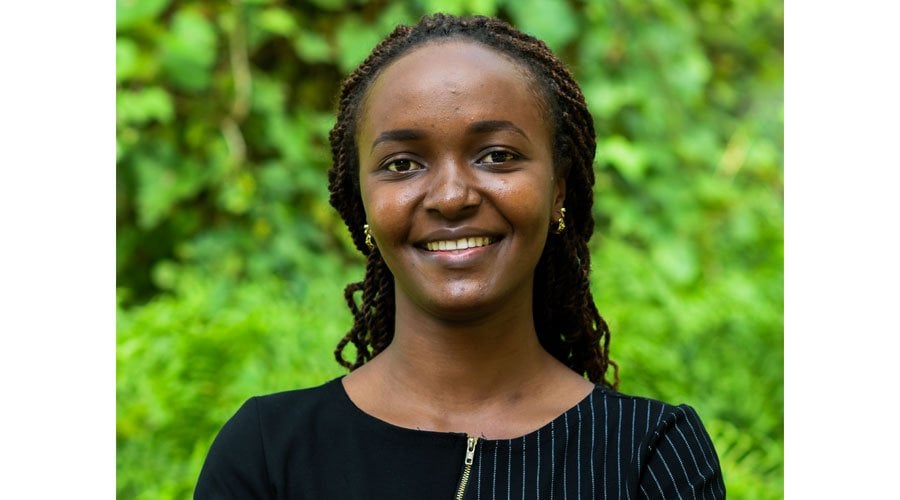Introducing Judy Baariu, LSHTM Fund Scholar 2023
14 May 2024 London School of Hygiene & Tropical Medicine London School of Hygiene & Tropical Medicine https://lshtm.ac.uk/themes/custom/lshtm/images/lshtm-logo-black.png
"Thank you for giving me the opportunity to share my experiences at LSHTM. The year was a remarkable journey filled with learning and personal development. I am currently based in Kenya, working as an Analyst with Genesis Analytics.
My time at LSHTM, supported by the LSHTM Scholarship Fund, has been an incredible journey of growth and learning. I've been challenged, inspired, and empowered. The knowledge and skills I've gained are invaluable, and I am eager to apply them in my professional life to positively impact global health.
Receiving the LSHTM Fund scholarship has been a transformative experience for me. It's not just about the financial aid; it's about the belief and confidence placed in my potential. This opportunity shapes my future, allowing me to contribute significantly to my field. I'm excited to use what I've learned here to make a real difference in the world."
Please tell us about yourself and your experiences. Where did you grow up, go to school, and go to university?
My name is Judy Baariu; I studied at LSHTM in the MSc Public Health for Development 2022/23 programme. I was born and raised in Meru County in the eastern part of Kenya, and I undertook my secondary education at Maryhill Girls' High School, a national school in Thika, Kenya. I later joined Moi University for my undergraduate studies to pursue a Bachelor of Science in Nursing, graduating top of my class in 2016. As the best student, I was bestowed an exchange programme opportunity at Linköping University in Sweden, which involved an impressive six-week learning experience of community health interventions. My strong educational background and passion for health promotion offered a well-grounded start to my career.
Please tell us about the last five years and what led you to LSHTM?
In 2018, I applied and was competitively selected for a one-year postgraduate Diploma studentship in Health Research Methods offered by the Initiative to Develop African Research Leaders in Kilifi, Kenya. Through a study I conducted during the course, I noted that there was a high burden of mental health problems among children in low-resource settings, and these were associated with preventable risk factors. However, communities often did not know these conditions, which led to stigma and poor long-term outcomes among those affected. After that, I joined a mental health awareness campaign named Difu Simo as a project coordinator and research assistant involved in implementing and evaluating mental health anti-stigma interventions through participatory action research. My work with Difu Simo helped me develop a deeper appreciation of the relevance of collaborating with communities to deliver contextually appropriate interventions and the need to advocate for integrating mental health in different care packages, such as primary care. My application to the LSHTM was inspired by an aim to hone my professional skills in designing and evaluating public health interventions in low- and middle-income countries (LMICs).
What are you passionate about, and why?
I am enthusiastic about health promotion and working with community members as collaborators to promote their health. This is fundamental in attaining quality, efficient and equitable health care. I also aspire to inspire other young women to engage in public health to promote health, particularly in low-resource settings.
What led you to specialise in this field and your particular course?
My undergraduate training and internship experience as a nursing officer at a public referral hospital in Kenya fuelled my passion for public health. During the internship, I worked with diverse community groups in poor rural areas with limited healthcare access, health promotion and disease prevention programs. This experience sparked my interest in becoming a researcher to understand public health problems, particularly childhood infections, malnutrition, and non-communicable diseases, to provide appropriate interventions to improve health and non-health outcomes. From my experience, one of the main challenges that often affected our work was promoting the sustainability of public health interventions. This led me to select the master's programme in Public Health for Development for my postgraduate training because it offers a multidisciplinary perspective on public health, focusing on LMICs. The program also involves public health professionals with substantial experience in planning, implementing, and evaluating public health programmes in low-resource settings, providing a unique platform for peer-to-peer learning.
What were the barriers to you achieving your educational goals?
Growing up, I always envisioned that hard work and dedication were the only bridge to achieving my educational goals, and while these provided a necessary foundation, I realised my academic progress was always limited by financial difficulties, especially at higher levels of education. I am immensely grateful to everyone who makes it possible for students to have such opportunities to triumph over economic hardships and achieve educational goals.
Have scholarships changed your life? If so, how?
"Scholarships have made a huge difference in my life and opened up new opportunities that have enabled me to grow into the person I am today and make an impact on health. "
What message would you share with those who supported scholarships at LSHTM?
"Thank you for educating the next generation. I am deeply honoured to have received the scholarship and extend my sincere appreciation for your incredible generosity. Your support has enabled me to achieve my dream of joining the LSHTM in pursuit of becoming a research leader in public health in LMICs. I hope to make the most of this opportunity and give back in future by supporting other students so that they, too, can reach their goals. "